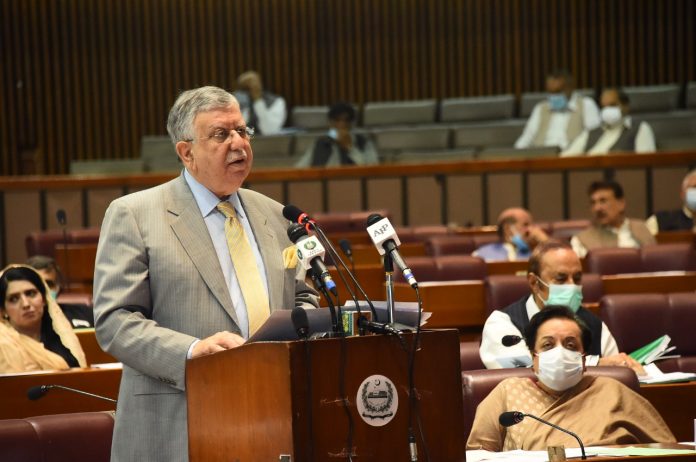ISLAMABAD: Finance Minister Shaukat Tarin, while announcing changes to the federal budget for the next fiscal year in the parliament on Friday, said that no taxes will be charged on internet usage or messaging, while every call that exceeds five minutes would be charged 75 paisa.
Speaking on the floor of the National Assembly, he said that visually-impaired mobile phone users would be exempted from taxes on handsets, Dawn reported.
Initially, the finance bill had proposed tax of Rs1 per call if the duration exceeds three minutes, Rs5 per GB for internet usage and 10 paisa on each SMS.
However, in a post-budget press conference, Tarin had clarified: “We are not doing it at this time.” He had said the proposals had been opposed by the prime minister and the federal cabinet so it was “off the table”.
The proposals had drawn the public’s ire, with users storming social media with criticism of the government. Many had even tagged the prime minister in their tweets saying that the “budget killed digital Pakistan initiative of the PM.”
This widespread criticism had also led to Energy Minister Hammad Azhar denying that additional duties had been imposed on telecom and data usage.
“The PM and Cabinet did not approve the FED levy on internet data usage. It will not be included in the final draft of the Finance Bill (budget) that is placed before parliament for approval,” he had said in a tweet.
During his address in the NA, Tarin also announced the reduction and withdrawal of other taxes.
He said the tax on milk had been removed and 17 per cent tax on gold and silver was being reduced to one per cent and three per cent, respectively. However, he added that the 17 per cent tax would remain in place for the value addition of the metals.
Likewise, Tarin said, the tax on poultry products and cattle feed was being reduced from 17 per cent to 10 per cent, and the tax on textile products for retailers had been decreased from 12 per cent to 10 per cent.
He further clarified that no tax was imposed on wheat and wheat byproducts.
“We have also withdrawn the withholding tax,” he said, adding that under a new auto policy, taxes would be reduced for cars up to 1,000cc. Initially, the government had announced that taxes would be reduced for cars only up to 800cc.
Tarin said taxes on the medical bills and provident funds of government employees had been withdrawn as well.
He further announced that taxes initially imposed on IT and e-commerce platforms had been withdrawn.
“We have completely removed the taxes imposed on registered platforms and reduced them to two per cent for unregistered platforms.”
He added that the income tax, which was increased to 35 per cent under the construction package, had been reduced to 20 per cent.
Tarin said Pakistan was facing major structural issues in the power sector as the government had to pay Rs900 billion on account of capacity payments for electricity that was not even being utilised.
“This also leads to an increase in the circular debt,” he pointed out.
Tarin said there were three solutions to the issue — either to let the circular debt increase, increase the budget allocation to address the problem or simply increase the electricity tariff.
But the prime minister had been resolute that there would be no increase in the tariff and the International Monetary Fund had also been informed of the decision, said Tarin, adding that the government was employing “out-of-the-box” ways to address the issue.
He assured that the circular debt would begin to decrease in the coming year as steps were being taken to decreased losses and increase the recoveries of bills.
However, he acknowledged that making improvements in the power sector remained a big challenge for the government.
Earlier on Thursday, talks between Pakistan and the International Monetary Fund (IMF) remained inconclusive after the global lender did not budge from its demand of increasing electricity tariff by Rs4.95 per unit and imposing taxes worth Rs150 billion.
The sixth review of the Extended Fund Facility (EFF) would now take place in September instead of July to review Pakistan’s economic performance under the IMF’s 39-month programme.
During the meeting of the National Assembly Standing Committee on Finance, which was presided over by its chairman Faiz Ullah, Tarin said that the IMF was asking Pakistan to collect an additional Rs150 billion from personal income tax, in addition to increasing electricity charges and power tariff.
“The IMF demanded that the government should increase Rs1.39 per unit price in June and Rs3.56 per unit in July,” he noted.
However, he said, Pakistan had clearly communicated to the international lender that the incumbent government cannot afford to further burden those already paying taxes. “This is the wrong way of doing things and we will be putting extra burden on the people and the industry” he added.
“Even if we protect poor people from increase in electricity prices, the cost of electricity for industry will go up that in turn will increase the prices of their products.”
The finance minister maintained that he did not see any risk to the programme. “We expect to receive over Rs400 billion [$3.1 billion] from the IMF in the next fiscal year.”

























The US is using all its clout to create all sorts of troubles for Pakistan. IMF,WORLD BANK & yesterday FATF.Expect more to come.
It is not about technicalities of taxes or tariffs or bases, or FATF’s one clause , but of the US’s Indian VP.
Let us identify the enemies within us &
Let us unite to face these challenges.